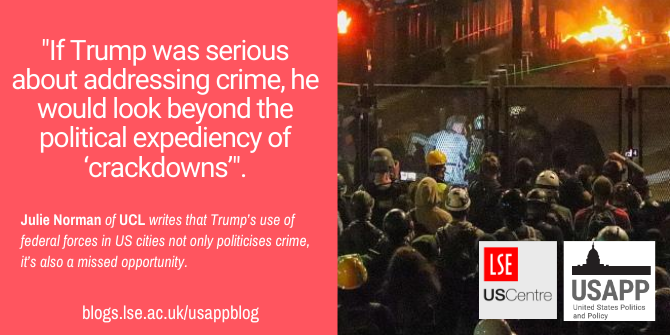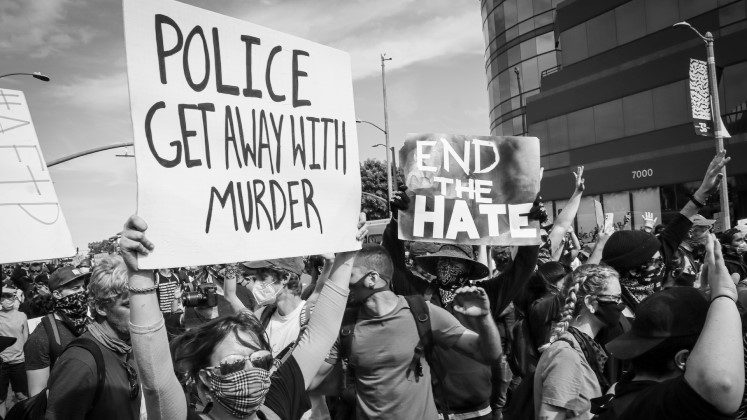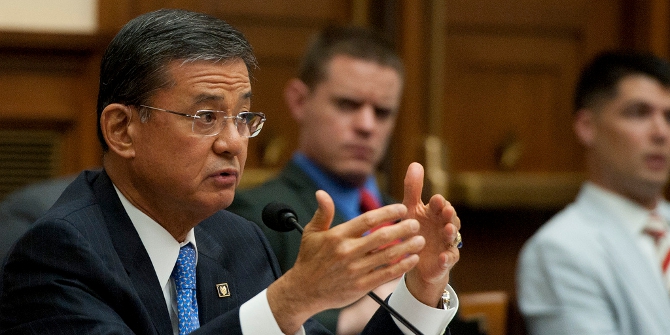 In recent weeks the Trump administration has deployed federal law enforcement agents to US cities which have experienced protests and unrest in the wake of the killing of George Floyd by police in May. Julie Norman writes that in sending these federal forces, Trump has not only politicised crime prevention, but has also missed an opportunity to address crime through preventative rather than punitive policies.
In recent weeks the Trump administration has deployed federal law enforcement agents to US cities which have experienced protests and unrest in the wake of the killing of George Floyd by police in May. Julie Norman writes that in sending these federal forces, Trump has not only politicised crime prevention, but has also missed an opportunity to address crime through preventative rather than punitive policies.
This month, in response to ongoing protests and unrest in the wake of the police killing of George Floyd in Minneapolis, Minnesota on May 29th, the Trump administration began sending federal agents from the Department of Homeland Security to Portland, Oregon. This week, President Trump announced that federal agents would also be sent to other cities, including Chicago, Illinois and Albuquerque, New Mexico.
Trump’s deployment of federal security forces to US cities politicises crime prevention and squanders an opportunity for embracing policies that actually could reduce rates of violence. Far from being at odds with one another, crime prevention, police reform, and addressing structural inequalities are inherently intertwined. The US needs better coordination and cooperation between federal, state, and local officials to address these challenges. But heavy-handed tactics for political gain, imposed on cities without consultation, will only further exacerbate existing tensions.
Trump is seeking to drive a wedge between the recent movement for police reform and the real need to address homicide rates in American cities, even though the two are inseparable. Violent crime, including rape, robbery, and aggravated assault, as well as murder, has decreased by over 50 percent since the early 1990s, and most major US cities have seen a further drop in most violent crime, excluding homicide, since the start of the coronavirus pandemic. But Trump is right that the uptick of killings in recent months, including multiple incidents involving children, is cause for both concern and action.
However, politicising those deaths is not the kind of response communities need.
By explicitly targeting ‘Democrat-run cities,’ Trump is intentionally making crime a partisan issue. In addition, he is further stoking tensions by blaming the increase in homicides on recent movements for police reform, although there is no data to confirm this claim. Though casting himself as a ‘law and order’ president, he is employing both words and actions that are exacerbating divisions.
Indeed, Trump’s divisive tactics are hurting rather than helping law enforcement and crime reduction. Local officials often work in partnership with the FBI, the Drug Enforcement Administration (DEA), and the Bureau of Alcohol, Tobacco, Firearms, and Explosives (ATF). But Trump’s imposition of federal intervention without local officials’ consent or even knowledge, combined with the aggressive and militarized federal response in Portland, will only strain those usually cooperative relationships.

Image credit: Tedder / CC BY-SA
If Trump was serious about addressing crime, he would look beyond the political expediency of ‘crackdowns’ and recognise that preventative policies have more impact than purely punitive approaches. Decades of research by criminologists have shown the importance of evidence-based prevention initiatives including youth employment programs, school-based counselling, access to mental health services, crisis interventions, drug treatment, and smarter probation and parole supervision.
Preventative policies are also linked, perhaps controversially, to better-resourced police services that are equipped and trained to engage in restrained and community-oriented approaches to policing. In this regard, Trump is right that ‘defunding the police’ – if the phrase was interpreted literally – would be problematic in many communities. But in creating a false distinction between crime reduction and police reform, Trump is missing an opportunity to find common ground between law enforcement officials and activists through policies that facilitate better police practices and simultaneously invest in much-needed social services and community development.
Indeed, crime prevention is linked not only to police reform, but to broader calls for addressing entrenched inequalities. In a recent interview, Just Mercy author, lawyer Bryan Stevenson discussed the goal of ‘abolishing crime,’ not through ‘crackdowns’ or aggressive policing, but by addressing the structural conditions that make individuals more vulnerable to crime. While much of the research on what causes people to commit crimes focuses on individual-level attributes, variables such as employment, education, and access to pro-social activities are directly linked to issues identified in discussions of structural racism and inequalities. Working with community leaders and activists to better identify and address those issues represents a much more democratic and sustainable approach to preventing crime than aggressive rhetoric and unilateral deployment of federal agents.
Crime prevention, police reform, and addressing entrenched inequalities are all complex challenges with no quick-fixes. But viewing them in isolation, or worse, in opposition, won’t help. Politicising crime prevention is a missed opportunity to build much-needed coalitions for improving American communities.
Please read our comments policy before commenting.
Note: This article gives the views of the author, and not the position of USAPP– American Politics and Policy, nor of the London School of Economics.
Shortened URL for this post: https://bit.ly/2X22zG2
About the author
 Julie Norman – University College London (UCL)
Julie Norman – University College London (UCL)
Dr Julie Norman (@DrJulieNorman2) is a Senior Teaching Fellow of Politics and International Relations at University College London (UCL).






